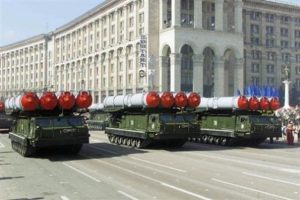
Israel’s Military Intelligence chief testified today before the Knesset, stating that proliferation of the S-300 air defense system could send the Israeli Defense Force’s capabilities “back to their status in the 1970s Suez years,” the Jerusalem Post reports.
For the past few years, media and official sources have reported intensified efforts by Iran and Syria to procure this advanced Russian-origin long-range surface-to-air missile system.
As early as March of 2009, the Russian Federation signed an agreement with Iran to supply a number of S-300 air defense systems to the Islamic Republic. This agreement was later rescinded, at least officially, under an executive order by Russian President Medvedev to conform with UN Security Council sanctions restricting the sale of conventional weapons to Iran.
Potential sale of the S-300 to Iran or Syria has unquestionably generated a great deal of sabre-rattling within the Israeli Knesset. While the majority of Iran’s air defenses consist of pre-1979 U.S.-origin HAWK missiles, many in the Israeli Government view the acquisition of an advanced air defense system as a regional game-changer, significantly raising the cost for preventive action against Iran by the Israeli Defense Force. A 2008 report by the Council on Foreign Relations even stipulated that transfer of the S-300 to Iran would practically guarantee Israeli air strikes.
While questionable sources report that as many a four missiles have already been delivered to Iran, or that Iran is pursuing an indigenous S-300 production program, the threat of Iran’s acquisition via third-parties, such as Belarus or the People’s Republic of China, continues to haunt Israeli defense and intelligence services. Likewise, strengthening ties between Venezuela and Iran has caused some in the Israeli Government to consider the possible retransfer of S-300 missiles to Iran from Venezuela, a non-sanctioned nation targeted for S-300 procurement, as a credible threat.